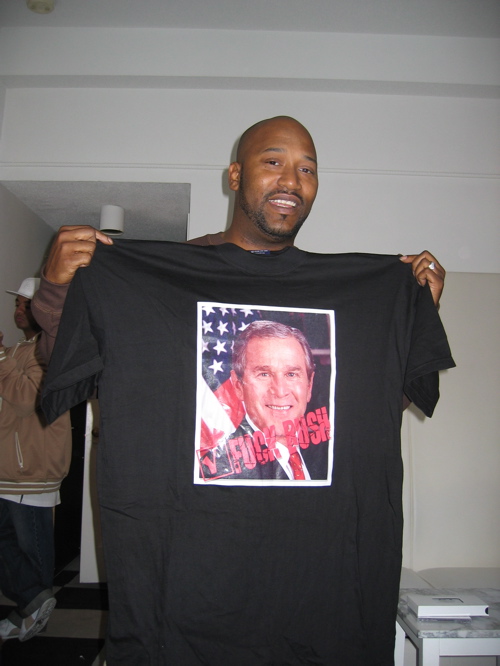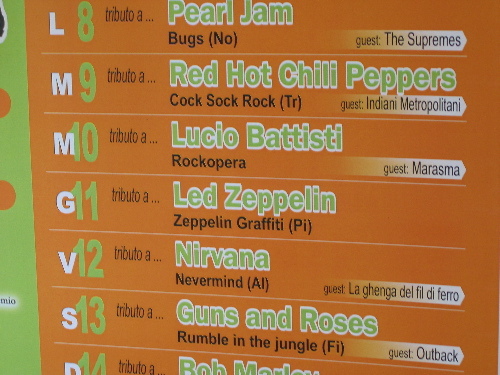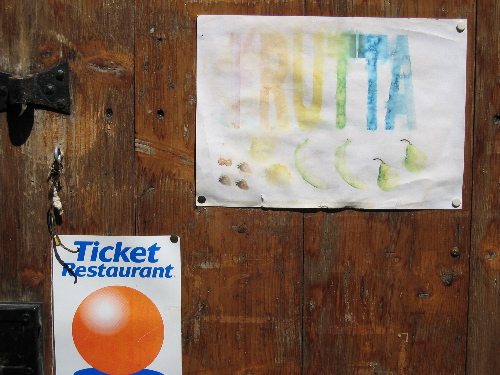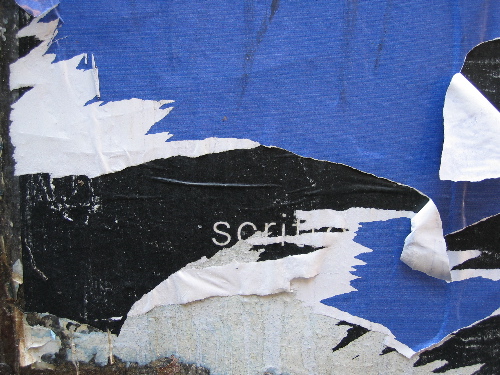October 31, 2005
HALLOWEEN WARNING

The population currently most at risk for abuse of prescription drugs is glow-in-the-dark skeletons. If you or someone you love is a glow-in-the-dark skeleton, please don't store him, or her, in the fridge. Simple childhood antibiotics like amoxicillin are pink and quite attractive to the skeletons, who no longer have brains. These drugs can be extremely harmful to a skeleton, mostly because they are dead and not real. Care for those around you, especially during this holiday season.
October 28, 2005
OOPS

"No, I'm telling you—hardware is where it's at. That, and the music itself—CDs, records. Nobody's going to get rich selling software."
"OK, Mr. Morita."
October 27, 2005
IT'S OFF TONIGHT

Anyone expecting some kind of "Lyrical Gangbangs Keep Falling On My Head" must take a quick sprint around the block, get some frogurt and find a new dream. Mr. Warwick's new album is dire bougie make-out piffle, and all Dr. Mr. Dre does is contribute three drum loops that I swear come off a sample CD. (If you really love Burt, what you probably want to hear—leaving Dre aside—is something like this. I do, at least, and I have no strong feelings about Bacharach either way.)
If you want an in-depth look at the genre Burt has gotten himself into, watch this promo clip for smooth jazz foot soldier Brian Culbertson. (I saw it on a United Airlines flight.) You have to watch the whole thing, and believe him, the way you would believe any of your favorite artists. The effect of taking him at his word is, at worst, interesting. Distance between you and Brian will eventually intercede, because dude is a turbochoad, but there's a chance that everything he says is not just marketing pre-cum. There is also a lightweight drinking game to be had in this EPK, and it would have to be called "Good To Go."
TAKING UP SPACE

Title: "None of Us Are Free"
Content: Bun B, Talib Kweli, David Banner and one unclearable Blind Boys of Alabama sample.
Topic: Katrina.
Heat level: 8.5.
Forecast: Get your nerd on and comb the mixtapes. It's gotta come out.
(Mac OS update: Do not use Tech Tool Pro 4.0.1 to work on yr computer if you're running OS 10.4.2. If you do, you will render it useless. Like I did. You gotta upgrade to TTP 4.0.3. Serves me right for being "tidy.")
October 26, 2005
NO HIP-HOP IN THIS BOX

But three copies of "Teenage Kicks." Wild guess. (Thanks to Joe Gross for the link.)
October 25, 2005
VERNACULAR SPECTACULAR

An email from Joshua got me thinking this morning. He pointed out a couplet from this song:
"Yeah, I love to see the neon dancin' on the gravel,
and I love to hear the pickup trucks as they come unraveled."
My first reaction was that fairly unattractive critical reflex, something like "Wait, that's my record. How did I miss that?" Of course, it's nobody's and everybody's record, though we both give Jon credit for spotting Miranda Lambert, so maybe that's his record. But what normal person would give a fuck, either about ownership or the rules of discovery? None more black.
Paisley's lyric—actually Guy Clark and Darrell Scott's—set off a brain chain: vernacular, everyday speech, interruption, popular poetics, how hard it is to transcribe an interview with Tego Calderon, Bun-B, vernacular poetics, Bun-B. Then there was an argument about who had been on the computer for ten minutes (or hadn't) and I wanted to kill everybody in the United States. (That feeling passed.) Then we engaged in some good "mathing" on the way to school. ("What if you had five potato chips, your friend had ten, and your other friend had two? How many would you have?" "No, don't do three friends—just do two friends, only two.")
On the train, the chain came back. In Ben Ratliff's excellent profile of Bobby Bare, there is a quote from Bare:
"I'm about half an introvert anyway."
So much better than "I'm sort of an introvert." There is something to be said about Southern speech, but this New York earhole isn't going to say it, because all I have is guesswork collated from novels and rap songs, and unchecked on-site observations. (I can say that the Houston accent is infectious, in part, because you feel inherently friendly if you start using it. And it's hard not to use it.)
And then, for the millionth time, this line from "Draped Up":
"'Cause we doin' it real big, in case you thinkin' we ain't."
This line succeeds largely on delivery, but also on the strength and delightfully simple logic of teeing up an assertion, suggesting it's false by suggesting that someone else thinks it false, while having the singer disagree. You get the traditional denotative narrator and the unreliable narrator all in twelve words. Bun also sounds really cool.
And one more:
"Quote of the Week
Jonathan wanted to spell the word 'earth.' He stretched it out, wrote 'rth' and then said 'Such a small word for such a big thing!'"
October 24, 2005
SURPRISING THINGS

I have things to say about The Rolling $tones live, and those things will not appear here. In the meantime, I am truly upended by the fact that I am, without straining, enjoying the new The Rolling Stones CD, A Bigger Bang. I don't know where to turn.
The testimonial from Officer Matthew Hyra on this page (which isn't permalinkable and will likely move down) was my favorite reading of the day. The cell phone of which he speaks is every popular in my house, but not with me. (Dude polices on a bicycle.)
THE CABBAGE

I like the head, the body and the kicker. One thing's for sure, and this thing needs to made clear to those who believe in (and expect) miracles like Tupac emerging from his Brazilian Nazi jungle retreat with a long beard and some fucked-up animal skin dashiki: Biggie is totally dead.
WHY ARE YOU DOWN THERE, I SAY?

Thoughts on Just Say Sire:
TODAY'S PERSPECTIVE:
1. "Everybody," Madonna
No reaction.
2. "Mirror In The Bathroom," English Beat
"Wait—bathroom?"
"That's pretty good."
3. "Kiss Me," Tin Tin
"Play this one again, this is my favorite." [Singing along.]
4. "Oh L’Amour," Erasure
"This is really good."
"This isn't good, this is aMAZING."
5. "Tainted Love," Soft Cell
"Number five sounds like number three." [Much singing along.]
6. "Situation (Remix)," Yaz
"MOVE OUT. MOVE OUT. MOVE OUT."
YESTERDAY'S PERSPECTIVE:
Disc One kicks ass all over discs Two, Three and Four.
Every disc, except for Three, has a killer first five. (Disc Three is hella odd.)
"People Are People" is the moment where Depeche Mode II find their feet, and is more complex than I thought it was in 198whatever, when I was too busy snobbing out on Vince Clarke's departure to Erasure. Also, DMII's greatest moment is their last great moment—"Enjoy The Silence," also included here.
Two of new wave's great accomplishments: 1. Compressing the ungainly post-Romantic twaddle of prog lyrics, while harnessing all the great, utopian energy of prog music, into tight, summarizing little packages. (Listen to Tin Tin or Modern English for a taste of either reduction.) 2. Letting unhinged conviction and ripe personality be the rule of the day for singers. If I am to drag out my somewhat threadbare and admittedly under-explained and under-theorized aversion to I*die R*ck, let this be one pillar of its future foundation: If you're not sure of what you're singing, why the fuck should I be?
Seymour Stein beats Ahmet Ertegun. Politely, and with some trouble, but it happens.
October 21, 2005
YOU GOTTA HAVE (OR BORROW) FAITH

In the early 1990s, before CBGB's had become a football in a grudge match between two equally useless nostalgia camps, the club booked bands of some interest. One was Th' Faith Healers. Though the best two shows of the time were likely Come and Thinking Fellers Union Local 282, the most surprising came from th' Healers (possibly opening for Come, though I can't be sure). The Healers' closing song, which was approximately twenty minutes long, was the direct inspiration for Ui's song "Johnny" (which was looped, without permission or recompense, for VH1's Fashion Week runway segment in 1995--"sue us," they said, charmingly).
Ba Da Bing! Records is releasing all of Th' Faith Healers' Peel Sessions soon. I encourage you to buy this record and give it to your parents.
October 20, 2005
WE ARE TOLD
that this is worth attending. Not to be all blindly promotional—we hate that, especially in ourselves–but we have a feeling our source is correct.
(It's a sound thing—"we" just rang better than "I" this time.)
ARE LISTENING TO TRILL?

Why not? Are you sleeping it off at The Foxhead? (Thanks to Nic Brown and Matthew Vollmer for their hospitality.)
I am up for the White Sox versus the H-Town All Starz: eighty-eight years of patience and teamwork (Contreras!) versus forty-three years of patience and the sun-hot love of everyone in the new capital of Southern rap—New Houston, as some recent arrivals call it.
October 18, 2005
HELLO, IOWA
See you tomorrow. Off to find a record store—you know it's Tuesday, a big data-for-cash day in the "industry."
October 17, 2005
IN THE MAIN

I think this is a pretty kick-ass performance in a medium that does its best to flatten and embarass live musicians. But perhaps you expect me to say this thing.
I haven't spoken much about the olden days, mostly because I don't remember them but also because, as blogs are already always narcissistic, you gotta be kinda careful. So I'll make it snappy. When I was young and thought playwriting was that next shit, it was almost entirely because of this man. Pinter was the first writer I thought was "mine," in that irrational and essential way that we claim the work of people who change our minds and provide directions. My one decent play (followed by two miserable pieces of shit) is so indebted to Pinter as to be a cover version, in Brooklyn accents. I was young and am entirely proud that I ripped off the right guy. Pinter is the motherfucking man. (I also tried to use Pinter to get over, proposing to the theater department that I direct a production of The Birthday Party, a plan designed solely to generate the chance to cast a girl I had a crush on. Never happened.)
October 14, 2005
ELECTRONICA ARTISTS DRAW BLOOD

What up, San Fran? It's not raining here, thank God.
Here's another old piece, the last for a little while. (The original Pretty Decorating pieces will eventually appear, and maybe something from Slant, a short-lived magazine put out by Urban Outfitters.) This one is about "electronica," which I vaguely remember. It was published in the Voice on January 30, 1996.
Electronica Artists Draw Blood
English people are a riot. I thought electronica was a moisturizer for robots. No! To be reductive, the twin towers of dance music and the avant-garde collapsed and a bunch of fast-moving kids and crusty old seers have been making hamlets from the debris, and what they make, sometimes, is electronica. They come from all over the UK: bedroom isolates with banks of equipment, dance-floor outcasts, straight-up art buddies, old art-rockers chuffed by the theoretical implications of sampling, and so on. They row the same boat by using space-age equipment (although not exclusively), working alone outside "scenes" formed by measurable quantities of "realness" or "ruffness" (that is, until someone made up electronica), and releasing records that get sold at dance stores and used by DJs, even though some of them grizzle on microtonally with very little swing.
Jungle helped cybergrow this whole genre by creating its own organic, very wide "real," rewarding psychotic one-upmanship and doing it as dance music even though it is fiendishly difficult for the average person to dance to. With that looming over you, it's no longer okay to fart ambient synthzak or do sound installations at the ICA: the social has met the asocial, and it's time to get down.
Electronica buddies have problems, too: overproduction and isolation. It's easier to make one of those tracks (mu-Ziq's Mike Paradinas estimates between four and six hours in a recent interview) than to bang out a song with the surly losers in your band. But without someone saying "I dunno, that sounds like The Wide World of Sports," it's easy to think you're Bernard Hermann when you're Vangelis. Just check out mu-Ziq's gratingly clever In Pine Effect (Astralwerks): CD technology and ease of production mean that 3:00 epics bloom into really boring songs that beg to be sliced and diced by DJs. (Wait for the DJ in all cases of trip-hop. Do not, we repeat, do not, open package without supervision as instant nap may result.)
Maybe I like Autechre because there's two of them to watch each other and keep the tracks lean. (Kraftwerk had four robots to split up the work. Some hoary old constructs of the rock band still prove effective.) Autechre's Rob Brown and Sean Booth rarely compose by default, as machines tempt you to do. Autechre songs follow a distinct syntax, fitting each ringing sound into its neighboring puffy sound. Though they use none of the obvious hip-hop signifiers, they program beguiling alien rhythms that make you move before they make you think. This is a nod to the early-'80s electro of Afrika Bambaataa, who found the heart of the machine in Kraftwerk's firefly pulse and hooked it up to the thing that became hip-hop. The intersection between electricity and blood is where the best of this electronica stuff piles up; like "Planet Rock" meets musique concrete, or something uneasy-listening like that.
The forthcoming Autechre full-length Tri Repetae (to be released on TVT in February, in a double-CD package with two other EPs) is as hypnotic and deliberately patterned as any hip crit stuff like Jajouka or Ornette or whatever makes you feel like you're fighting the Bill Gates monopoly in your own earthy way, although, no, it doesn't conjure fire or make time dissolve or anything. Autechre know the analog to human physical and emotional processes and represent them with the right 1s and 0s. That is, if you thought "Musique Non Stop" and "Trans Europe Express" were kinda on.
The electronica buddies still linked to dance music grapple with the aesthetic problem of going compositional (make interesting music you can listen to anywhere) or staying functional (temper exploration with a constant BPM for the dance floor). Trip-hop slid off the map by choosing the latter, even though its shining moments follow the former (DJ Shadow's What Does Your Soul Look Like [Mo’ Wax] and Skylab's #1 and These Are the Blues [Astralwerks]). Where hip-hop pits the active MC against the static rhythm loop to create meaning, nap-hop presents stasis and texture as mood and meaning. The average listener often identifies this problem with the word "boring." No wonder no one wants to be called a trip-hop artist.
Wagon Christ (a/k/a Luke Vibert) definitely doesn't like it, and in his case, I can see why. Vibert draws blood from hip-hop, 2001, and jungle without turning into anyone's vampire. Their/his Redone EP [Rising High US] is a tight summation (tighter than the impressive but exhaustingly unedited full-length Throbbing Pouch) of many threads: Luke's remix of his own "Reedin'" is trippy and hoppy and stringy in all the right, unboring ways; Aphex Twin's remix of "Spotlight" is some serious White Man Jungle, a stuttering handful of moire patterns made up of farty analog synth sounds; and Voyafose and Boymerang's remix of "Pull My Strings" is half trip, half junglist, and all freaky Logan's Run shit.
Finland's Panasonic bust on through with full Kraftwerk approach. These three grumpy buddies play old analog synths in real time and bleep on with some Morton Feldman monochromatic relentlessness. Their album Vakio has enough of a pulse to be sold in dance stores and rock boutiques, the latter maybe because it's on Blast First, maybe because the "fuck you" has moved off the interview page and into the music. These guys don't make things easy—tracks burp along steadily for minutes, accreting little bits of sonic detail but never letting you get so spacey you lose the taste of the burps. Kinda like how Gang of Four's funk kept you too awake to start feeling like everyday people.
Panasonic's stern waves illuminate another salient division in electronica: digital and analog sound operate very differently. In this dispute, indie rockers remain inhospitable toward samplers and other digimoves, but go dreamy about wheezy, weather-sensitive analog synthesizers (witness the current explosion of tags like "space rock" and "oscillator boogie," created to help contain this explosion). In this case, more power to them, if Panasonic's what comes up. Spartan as it is, Vakio has a stonelike depth that illustrates another advantage of electronica: you can stay in the pop culture trenches while zapping into some pretty elevated information. (House music has long combined hard church with the hard-on.) Songs, schmongs.
October 13, 2005
SCRATCHING THE SURFACE
Hello, Voice and Brooklyn Vegan readers. Welcome to the show. Here's an old piece, published in the very same Village Voice, this one on August 19, 1997. It is about Lee Perry.
SCRATCHING THE SURFACE
Lee Perry Is as Crazy as You Want to Think
When is a "crazy black man" a crazy black man? From Monk to Marvin to Dr. Octagon, the myth of black lunacy has been publicly inseparable from the reality of black genius. Monk knew how to fake a straitjacket, and it wasn't because people on Saturn wear leopard-skin that Sun Ra did—lunacy is a pill that nonblack America sometimes needs to ease the pain of admitting that almost all of the formal innovations in popular music have been made by black musicians. Lee "Scratch" Perry has created his own realm of stealth weirdness, simultaneously writing and unwriting the history of reggae, often on ras bumba claat's dime. Perry's life is its own rich remix.
There's no one with a history in Jamaican music like Hugh Rainford Perry, born in 1936. Roughly speaking, there are four major phases of his career: (1) 1963 to 1973: Perry interns with the legendary Coxsone Dodd, scouting talent like the Maytals, and helping record acts at Dodd's Studio One as the music evolves from mento to ska to rock steady to reggae. Eventually falling out with Dodd, Perry goes on to work with rival producer Joe Gibbs, forming the first versions of his own Upsetters house band and starting the Upsetter label. Perry's 1968 jab at Gibbs, "People Funny Boy," slows down the beat of ska to create what Perry alleges is the beginning of reggae, but he'll have to joust with Toots about that one.
(2) 1969 to 1978: Perry teams up with the pre-Island Bob Marley and the Wailers, recording some of the most staggering roots reggae ever. Aston and Carlton Barrett abandon the Upsetters to join the Wailers full-time and Perry begins to work with excellent vocalists like Junior Byles, the Congos, and the Meditations. With King Tubby, Perry helps create dub, which he stretches to the breaking point in the next phase. (3) 1974 to 1979: Perry builds the Black Ark studio in the yard of his home in Washington Gardens, one of the most mythologized locations in popular music, variously attributed with X-Files powers, unusual smells, invisible engineering attributes, and a palm tree with an audible heartbeat. Amid controversy, most of the Ark burns down in 1979 while Pert grows increasingly paranoid. (4) 1980 to present: Records a hodgepodge of solo albums as a vocalist with various backing bands in New York, Kingston, New Jersey, London, and points elsewhere.
CRAZY STUFF SCRATCH ALLEGEDLY DID: Take dumps in his own studio and arrange them symbolically; burn his studio down to scare off a German groupie; walk backward hitting the ground with a hammer for a week; place curses on various enemies; blow an advance from Island on an antique silver set from Cartier; worship bananas; eat money; baptize house guests with a garden hose.
CRAZY STUFF SCRATCH DEFINITELY DID AND DOES: Call himself Pipecock Jackxon, Kimble, and The King of Mess; write all over every available surface of Black Ark; glue mirrors to his clothing; speak only in rhyme; sire many children in many countries; call Chris Blackwell a vampire; build a duck pond inside the Black Ark studio; issue hectoring musical broadsides against onetime friends he decides have cheated him, including Prince Buster, Coxsone Dodd, Joe Gibbs, Bunny Lee, Chris Blackwell; quote the Bible liberally, changing key words that don't fit; license tracks to multiple parties.
What makes Scratch so good, though, is his distortion of the reggae mise-en-scene. In a basically conservative genre, producer Perry's antiscience science of intuition and quick hands injects chance, humor, and disaster without ever really leaving the pop song behind. Those who look to Perry's shit talking for a cosmology will get burned; those who dismiss his output because of his shit talking will miss the aurora borealis of reggae.
Roast Fish Collie Weed & Corn Bread for example, one of the few records credited solely to Perry as artist and probably my fave, pits house band rhythms against Perry's pixie-dust percussion and mixing-desk abuse, over which Scratch narrates like a homeless Martha Stewart on how to stay healthy, how many lights are broken on his block, etc. His mic skills on any of his records are easily protorap, his dub stylings (like Jah Lion playing dominoes louder than Max Romeo's singing on "Norman") are closer to John Cage than King Tubby, and his uncredited cover versions of tunes like "Tell Me Something Good" and "Fever" made him a lawless proto-Puffy. And it was all recorded at Black Ark with only a four-track 1/4-inch Teac reel-to-reel, 16-track Soundcraft board, Mutron phaser, and Roland Space Echo. Bouncing tracks together to create 16-track thickness, albeit with considerable signal degradation and tape hiss, Perry bubbled more than pavement in July and was guided by voices that could actually sing.
Perry doesn't compile easy because, like every Jamaican artist since 1964, he made umpteen records, most of them seven-inches produced for the voracious, day-to-day music consumer. He's made coherent albums when it mattered to him or when Island pressured him—Roast Fish and Super Ape are examples. But he's done much of his work on the fly, and the lion's share of that work has been for him to license and others to sequence and package. And Perry is still mortal: plenty of other Jamaican producers have more consistently heavy rhythm tracks, like Tubby or Burning Spear, and better-sounding records overall, like his mentor Coxsone Dodd.
Also, since Scratch spent most of his time producing, conceiving, and conjuring behind the boards, attributing specific tracks to him can be tricky. In the intense assembly line of Jamaican music making from 1966 to 1978, with tireless house bands, recycled backing tracks, and revolving engineers and singers, roles are not easily defined. Long before the sampler started eating up an existing recorded catalogue, Jamaican recording practices—five or 10 prereleases for every commercial release—cannibalized authorship before it was established. The weekly flood of 45s on Upsetters, Trojan, Black Art, Wild Flower, Orchid, Scandal, et al. doesn't make an easy historical trail.
Arkology attempts to document the breadth of the work done at Black Ark between 1975 and 1979. Things start grandly with "Dub Revolution Part 1,” an Upsetters dub complete with drum machine, Perry's mouth noises, and some well-meaning "na na na" vocals that all conspire to sound benevolent, cracked, and cosmically complete. You can even hear mixing desk buttons click on and off as Per mutes and unmutes the rhythm rack toward the end. After that, compilers Trevor Wyatt, Steve Barrow, and David Katz opt to make Arkology into Island-ology, fleshing out Island's out-of-print Scratch on the Wire collection with alternate takes and dubs. What you get is rich, canonical, and juicy but a bit misrepresentative. You just can't compile five mixes of "Miss You;' five mixes of "Undercover of the Night,' and call it Stonesology.
Arkology follows the artistically respectful if tedious practice of following each vocal version with its dub or instrumental counterpart, culminating in a numbing six versions of the "Police and Thieves" rhythm. This is instructive for anyone who doesn't understand that rhythms in reggae music are used many different times by many different artists. I bet, though, that such a fact stated in the liner notes plus one or nvo examples on CD would have driven the point home. Believe me, you can live without "Magic Touch," which is Glen DaCosta soloing on saxophone over the length of "Police and Thieves." And the Island-funded Perry productions Arkology cuts its firewood from—The Heptones' Party Time, Max Romeo's War Babylon, Junior Murvin's Police and Thieves, and Jah Lion's Columbia Colly—still work well as their own freestanding albums.
More egregiously, Arkology has audio deficiencies: unacceptable digital-mastering resolution (a sibilant tinniness, like a voice traveling through an aluminum tube) puts the whammy on tunes like "Tedious,” "Bird in Hand,” "Soul Fire,” and "Curly Locks." This makes me doubly mad because the VP issues of Roast Fish and Return of the Super Ape, taken straight from vinyl with the tone arm audibly bumping over divots, sound better than this allegedly more legitimate release.
I'm not always such an audio geek, but when the meaning of a work consists of the spirit in the sound, the cardiac frequencies of the beat, it's time to get the ones and zeros straight. If we can bounce a 4 x 4 all over Mars, by god, we can make available a decent CD version of Scratch's back catalogue. I can't think of another black artist this major whose key works remain either out of print or available only in mildly legitimate licensed versions.
There are two other recent Scratch releases. Upsetter in Dub (Heartbeat) compiles B-sides from Perry's Black Ark era and before (at Randy's Studio 17), the latter comparatively light on extreme dub moves, tending to skank rather than splatter. The highlights are the Black Uhuru-ish vocal dub of "Son of the Black Ark," which threatens to burn down Babylon (but in a nice way), and the churchly, vertiginous "Rejoice in Skank,” blessed with the overheated hovercraft stink that distinguishes good dub from boring instrumentals.
Technomajikal (ROIR) shows the Perry who, since 1980, has become the Orson Welles of dub, pimping out his catalytic presence and dope vocals to voiceover a variety of backing tracks created by admirers. Dieter Meier, once of Yello, provides, like, techno dub, in alliance with X-Perry-Mental (Lukas Bernays and Jeannot Steck), while Perry lays over compudelic toasts in what sounds like a good hour in a Zurich studio on someone else's tab.
The Beastie Boys' devoted and informed championing of Perry in Grand Royal two years ago is probably responsible for some of this new spate of Perry product; it's also easy to observe Perry's spirit inhering in musicians who have, consciously or not, channeled it. Like Tricky, who sounds like Perry with his claustrophobic beats, persecution rhymes, oblique female voices, and fondness for other people's lyrics; or the RZA, who produces like Perry: quickly, and with no regard for harmony or hygiene, a taste for pop tunes sung badly, and an eye to releasing recordings on every record label in the world.
So who's crazy here? Is Perry a lucky oddball who happened to hook up with the Wailers, happened to find the Maytals, happened to choose the Congos, the Meditations, and Junior Murvin to sing his crazy ideas, happened to encourage Tubby's experiments? The moral of our story: Worship bananas but don't front on the skills.
October 12, 2005
THE BOOK OF MOONLIGHT IS NOT WRITTEN YET

Sometimes, computers are funny, and sometimes celebrities need friends.
Do you find yourself bracing for 50 Cent news? Like, "50 Buys Beatrice Corporation With Cash" or "50 Cent To Replace Peter Jennings" or "50 Introduces New iPod G-Nano."
MORE OF HARRIET MIERS' CORRESPONDENCE
Dear Angela Merkel:
How great are YOU? I cannot believe that Germany has its first lady leader! Let these congratulations be the first of many you will receive today. I was going to send a card instead of this dumb email, but Hallmark doesn’t have a category for amazing people like you yet! I have heard that you are building coalitions, and I want to be the first to applaud these brave and appropriate actions. Coalitions have been going out of business left and right here, and the big storm didn’t help at all. If there is any way you can raise any of the coalitions way above sea level, do that first. Anyway, you can instant message me at HarrietTHAspy102, or just call! I’m usually up, baking or just chilling! :)
Xoxo Harriet
--------------------------------------
To Ms. Kate Moss:
I heard about your recent problems with substance abuse and I wanted to reach out and say hello. I may be a judge soon in America and I want you to know that if I ever have to levy a fine or impose a sentence on you, I would take the entirety of your life’s work into consideration. I am a huge fan of Elton John’s and trust that he would not endorse anyone who was not a principled and valuable member of society. (I was lucky enough to meet the man. What a teddy bear! So cool, so timeless!)
I do not know your work as an artist very well, but my close personal friend, Beatrice, is a fan of your work and says you should be able to work in peace without a million prying eyes disturbing you. I am of a similar mindset. And if you at any time have terminated a pregnancy, I think that—as long as you did a pinky swear to never bring it up—we could work around that.
Please write if you have any legal questions. I am pretty good with explanations!
Harriet Miers
MORE NEW RELEASES

The Warlocks: We Came Close To Pulling It Off, But Those Jesus and Mary Charm Bracelets Are Harder To Make Than You'd Think.
Darden Smith: You Had No Idea I Had Made Nine—Count Them, NINE—Albums Before This One, And Don't Try To Tell Me You Did.
CAN'T KEEP MOONING ABOUT LIKE A SADDO
From one of our in-house writers' day gig (emphasis mine):
"The children began working on their stories and making books like real writers. We talked about what does it mean to be finished and we agreed that a book is done when it has pictures, writing, and the writer's name on it. The writer also needs to share it with one person before he or she can move on to the next piece."
October 10, 2005
October 05, 2005
JOIN THE CLICK

This article was titled "Join The Click" and published in the Village Voice on May 13, 1997.
JOIN THE CLICK
Be it made electronically or with muscles and fingers, all sound is comprised of clicks cycling at different speeds (i.e., oscillating), scalar notes just being clicks going fast enough the separation between them is no longer audible. When slowed down, clicks become beats. "Teurastano,” from Kulma (Mute), the latest album by Finnish analogue synth duo Panasonic, the Martha Stewarts of the click, illustrates this clearly: After sounding once at the opening, a click accelerates to become a tone and then, quickly, a jiggling, staticky tone that threatens to overtake the whole track. An air-raid buzz starts a-funking, steam blasts start, and we've got the Many Moods of the Click, velocity and space working out the differences.
Using oscillation in this manner, the hierarchy between melody and rhythm becomes a fluid continuum of sound that yields many good things—"Teurastamo" could be a grouchier Chemical Brothers and "Kylma Massa" is a lovely spray of clicks behind glass. The continuum does not include indulgences like, say, harmony or melody. If a track begins and you don't like what it sounds like, you're out of luck—that's where you're gonna be for a while.
Lead ‘Sonic Mika Vainio makes even more stripped-down records under the name Ø for Sahko, the Finnish label the group calls home when they're at home. Ø’s Olento is a fairly stunning stretch of oscillator mesa, but the Sahko family gem is the remarkable Kosmos EP, allegedly recorded by a pair of exiled Russian engineers. A music box rattles, while commanders Pulyov and Kostovich make a sandbox from radioactive erector set pieces. A shame its a fancy import 12-inch, because electronic music's allegedly limitless promise rarely yields anything this truly alien and beautiful.
The act that's probably done the most radical thing to the click is Oval, a/k/a Berliner Markus Popp. Over the course of Systemisch and Diskont94 (both reissued here by Thrill Jockey) the soft-edged click of a skipping CD player is turned into a melodic strategy. If Kosmos is Hansel and Gretel on Sputnik, Oval is the stars themselves, grumbling, orbiting, spitting out notes and un-notes simultaneously. Systemisch is the keeper by a slight edge, with a sonic m.o. as identifiable and pleasurable as My Bloody Valentine's. Making good on the Clinton-style wishy-washy promises of ambient-electronic-dishwashing music, tracks like Systemisch's "Aero Deck" sound pastoral and reassuring at low volume, bursting with overtones and spatial structure at rock volume. Popp's pops are not arrayed by default.
I don't have the column inches and you probably don't have the downtime, but new CDs like Ryoji Ikeda's +/- (Touch) and Bernhard Günter's Un Peu de neige salie (Table of the Elements) make an hour of music from nothing but pops and clicks and silence. If that sounds like fun to you, now you know where to look. And, for the record, they really don't use any other sounds than clicking, so I gotta give a shout out to them. I prefer a little more music in mv music, but Ikeda and Günter's sense of the stereo field does raise mv neck hairs.
Back in the world of music that gets played on the radio, the click has kin in the continually shrinking drum sounds of hip-hop. In-demand producers Mobb Deep and Trackmasters favor constrained samples that thump and snap more than they boom and ring. Heard favorably, they sound like a contact microphone recording the blood coursing through someone's temples, menacing and implacable. Heard by the old-school fiend in me, they sound momentarily spooky and then kind of thin. This may not be my idea of a good time, but I at least understand the deployment. Tight sounds can suggest pressure and anxiety while functionally clearing room for melody samples and voice. In r&b, the click reads as intimate, like skin smacking or rain on the window.
Excellent, high-gloss woodpecker r&b like Aaliyah's "One in a Million" and "Hot Like Fire" make lovely use of the click, pitching bass sounds way below it and leaving a sexy Grand Canyon between the two. "Hot Like Fire" samples the ur-click beat, Al Green's "I'm Glad You're Mine" from 1972. You know it, even if you don't; it's drummer Howard Grimes's magical intro, a tango of kick drum and rimshots touching toes, alternating in binary morse code so funky funky had to call in sick. First sampled, I think, in 1989 on Eric B. and Rakim's "Mahogany,” this track has subsequently been referenced by a frightening range of musicians, most recently sampled twice (guys, preplanning meetings!) on Biggie's Life After Death, again on triphoppers Recloose's "Bug-Eyed Blues" (This Is Home Entertainment Volume Three), and then quoted by the drummer for soul-punks the Make-Up on "Tell It Like It Will Be." This variety of usage marks the point where a sample becomes (as "Funky Drummer," "Apache,” "Amen, Brother," "It Takes Two,” and "It's a New Day" have become already) functionally similar to public-domain folk songs, a textual point around which a common experience pivots, accruing enough meaning to constitute something like a genre unto itself. (In the case of drum 'n' bass, definitely a genre unto itself-as it subsists mostly on four drum samples.)
"I'm Glad You're Mine" marks the beginning of the click that winds up through soul into hiphop and current-day blends like Erykah Badu and the Roots, who believe that, hey diggy diggy, rimshots will nice up the place all by themselves. Puffy Comb's remix of New Edition's "You Don't Have To Worry' puts the job of next-level funkiness squarely in the hands of a machete-like click. The song's intro isolates our favorite ingredients: a syncopated synth click that's all attack and a kick drum sound with no edges providing a brutal low-end thump (the click's inverse). (Then there's a song and some singing.)
Another remarkable r&b cut in this vein is "Love You Down, by Jodeci's Devante Swing, operating under the name Da Basement, from last year's Nutty Professor soundtrack. Coming off like a Panasonic and Prince duet, the track pays fevered, loving attention to sound. Insistent tippy-tapping and distorted kick drums boom along next to a trembling guitar arpeggio closer to Sebadoh than the Isley Brothers. Add pre-orgasmic falsetto singing, over-the-phone mumbling, and an error-alert bleep and you've got alpha beta Mastroianni robot love music. Remember when the Artist used to get this deep with a click? Remember "The Ballad of Dorothy Parker"?
So I'm just a fool for little sounds. Why might everyone else be? (1) It's part of another (alleged) revolt against (allegedly) worn-out signifiers of rock like "big" or "good" drum sounds. The snare, the seat of much rock excitement and endless hours of engineering foolishness (try listening to John Mellencamp circa 1985 for thousands of dollars of "big" snare sound), is seen as rockocentric and played out. If you're gonna have one, make it weird and small. (See also Helmet’s John Stanier and his tightly wound, timbale-like snare sound, which helped undo some of the worn-out machismo of a solidly male music.) In r&b, it's just a further step along the continuum moving away from similarly corny '80s stadium sounds. (Listen to Jody Watley's "I'm Looking for a New Love" and see if it doesn't sound hopelessly dated in a way that, say, "Billie Jean" doesn't.)
(2) Click-wielding is a heady game of one-upmanship: if you can use some blippy ticky-tock sound with no sustain, no decay, and still manage to swing, well, you're special. (3) New awareness of detail brought on by the magnifying glass of the sampler has caused it all. Ten years of listening to three seconds looped for five minutes has given people dog ears for differences in pops, static, and recorded ambience ("That's the B-side of `Doodle Oop' slowed down!"). This audio pornography reaches a logical end in music that's all detail and no figure. (4) Everyone wants to stop making music but they're too chicken so they just make it smaller so maybe no one will notice.
THIS IS WHY I CANNOT HOLD POSITIONS OF GREAT RESPONSIBILITY

I cannot look at the title of this album. I support the mangling, repurposing, adjusting, titrating and ripping to bits of the English language; there is no axiom lurking inside my revulsion. Trina's title is just the ugliest neologism/pun/reference I've seen, like, ever. It makes me long for Blink-182 album titles.
October 04, 2005
THEM SWEDES WHAT KNOW

telll me that Dungen, no disrespect, is straight copping Pugh Rogefeldt, and those what are straight fancy go on to cop licks from Hakan Hellstrom, who is better in some imperceptible way. (Pugh is most best known for being sampled by El Shadow.)
COMING SOON—MAJOR EXECUTIVES POST EXACT LENGTH OF PENISES

What's most insane about this "explanation"? That it's been up since 2003? That it would be posted at all? The number of "facts" or "givens" casually woven into a totally illogical and crazy idea? The threadbare idea that all the money spent on behalf of a CD is NECESSARY?
Try, for starters, the below passage, the ending of which refers to its beginning. Suggested translation: After a record company spends a whole lot of money that will quite possibly have no affect on the sales of an artist's CD, the artist has to hit the road hard and make actual keepable money, because any and all royalties earned by his or her CD from now until about 2010 will go straight to the label, who will be recouping money spent 'promoting' the artist. The label will see this tour not as the artist's chance to earn but as yet more promotion to help sell CDs and pay for the first round of promotion.
"Then come marketing and promotion costs -- perhaps the most expensive part of the music business today. They include increasingly expensive video clips, public relations, tour support, marketing campaigns, and promotion to get the songs played on the radio. For example, when you hear a song played on the radio -- that didn’t just happen! Labels make investments in artists by paying for both the production and the promotion of the album, and promotion is very expensive. New technology such as the Internet offers new ways for artists to reach music fans, but it still requires that some entity, whether it is a traditional label or another kind of company, market and promote that artist so that fans are aware of new releases.
For every album released in a given year, a marketing strategy was developed to make that album stand out among the other releases that hit the market that year. Art must be designed for the CD box, and promotional materials (posters, store displays and music videos) developed and produced. For many artists, a costly concert tour is essential to promote their recordings."
TO DO

“I can fold my tongue, skip, snap my wingers wet and dry, and swim. The next level is whistling and then also riding a bike.”
MORE

I make no grand claims for the interview excerpted below. I spoke to Fiona more as an advance fact-checker, not on some soul-of-the-artist profile ish. I wanted to be not inaccurate, and talking to the person you're writing about sometimes increases the degree of factual accuracy in your piece. (Not always.) There's not much I can do with this material, so posting it here seemed right. (I took out my insanely boring droning bits.)
(This combines interviews done on September 16th at the W Hotel and September 18th at Café Botanica in the Essex Hotel.)
Sasha Frere-Jones: I imagined that you worked on “Extraordinary Machine,” changed your mind, did some more work, and somebody happened to open the door in the middle of it, and got an idea that there was something wrong.
Fiona Apple: That’s a good, simple way of putting it.
SFJ: There’s a quote from one of your interviews that gets re-printed all the time: “If I have something to say, I’ll say it.” I thought, “O.K.—that’s what Fiona does. If she was really pissed, she probably would have said something.”
FA: That’s pretty much that’s what happened. We did a lot of work, and I just felt like I wanted to do more. I wasn’t satisfied yet. It was a situation where—it could have been miscommunication, I’ll never know the exact truth—but in order for me to keep on working and re-do some of the stuff, I was told that I was going to have to hand everything in, one song by one song, before I could get the money to do the next one. I didn’t want to do that. It implied to me that whoever I was going to hand it in to was going to check it, and they were either going to like it or not like it, and if they didn’t like it, then they were just going to own another piece of music that I loved.
For a while after that there was just nothing going on, and I didn’t really think I was going to make the album. I didn’t want to blow my shot at making the record the way I wanted to. I was feeling kind of like the company wasn’t really excited to have me, anyway. I had the thoughts in my head like, “I wonder if I can get out of this place? What if I record something and I love it, and then they own more of my stuff? I’m never going to be able to get out of here, and they’re going to own all this stuff.” I lost track of what I was saying. I just walked away, and nobody really seemed to care until it got leaked. I had been thinking of maybe trying to do something else with my life.
SFJ: Like what?
FA: I filled out an application to go be an intern at this place called Green Chimneys in upstate New York. It’s a place where they do occupational therapy for kids, but they use farm animals. I’d been a volunteer a couple of years before for occupational therapy with kids, and I really enjoyed it. The fact that there were farm animals involved was really cool. So I applied for an internship, which was going to be in the winter in upstate New York, for four to five months. I was really excited about it, and I was really sure that that’s what I was going to do. And then everything started happening again.
SFJ: I assume they accepted your application.
FA: I don’t think I ever sent it in. I’m trying to tell myself that it’s because everything started up again, and not that I chickened out because it was going to be cold.
SFJ: When you handed in the first version of the record, were you happy with it or not?
FA: I’m just as proud of the first version—the one that got leaked—in a different way, as I am of what actually came to be, but it just wasn’t exactly what I had in mind. It was my fault that it didn’t turn out exactly how I wanted. I checked out half-way through, and was not around to make decisions. I wrote almost some of the songs while we were recording, and I’m not used to not having enough time to live with the songs. Usually, if I write something, I live with it for a little while, so that if I know that I’m going to record it, I know exactly what I want. I didn’t have that this time, so once it got to be recording time, I was like, “I don’t know the song, I don’t know what I want.”
SFJ: It had been different on the record before?
FA: When I asked Jon to produce “When the Pawn,” I invited him over to where I was living at that time. He hadn’t heard any of the songs. I had him sit down, and I went through every song, gave him the lyric sheets. I was totally prepared for that. But I’m not a control freak. With somebody like Jon Brion, you let him go and do a bunch of stuff. You don’t say “I want something like this.” It’s not taking full advantage of what he can do.
SFJ: Did Epic say they didn’t hear a hit on “Extraordinary Machine”?
FA: They never said they rejected it and they never shelved it. I came here, and I had a meeting with them. They never said directly to me, “We don’t hear a hit.” I said, “I don’t really feel like it’s exactly what I wanted to have.”
I know what my part of the job is: I know that I write the songs, I know that I sing them, I know that I play them on the piano, I know that I have a feeling in my head—I have an intention with how they’re supposed to come out—but I don’t know how to articulate it, musically, with other instruments. On the “When the Pawn . . .” album, Jon and I had a perfect working relationship because I would go in, do my stuff for three or four hours and leave. He would go and do everything on anything he wanted, and then I would come back. I would listen to stuff and say, “Oh, I like that, and, oh, I like that, and I like this with this.” I would know what I wanted, and then that would be that. On “Extraordinary Machine,” I didn’t know what I wanted, and I didn’t help him at all. Maybe I’m just making up this memory, but I’m pretty sure he told me how frustrated he was with me. I imagine that he must have been because here we are, we’re recording, and I was like “I don’t know what I like; I don’t know what I hate,” and it was a really scary place for me to be in. As a result of that, it came off more as a Jon Brion record, you know? I love it. I do.I delicate because I’m saying, “Well, it turned out to be a Jon Brion record, so I wanted to do it again.” It’s hard to say that without saying “Jon took over,” like Jon threw up all over it. It’s not that at all.
SFJ: Since you guys are playing all together, I am guessing your decision to re-do it didn’t bother him that much.
FA: I don’t know. I haven’t asked him. We never really had a conversation about it. It was assumed that I was going to be trying other things and he had moved on to other things, and I know he loves Mike, and he knew about me starting to do stuff with Mike. I’m sure that he just wants me to be happy with my songs. It would be more important for him to see me finally being able to make decisions. I don’t think that I’m a perfectionist at all; I think that I’m sloppy. In my head, I’m always wearing sweatpants.
SFJ: Is there any currently popular music you like?
FA: I have no sense of what gets on radio or MTV. I have not listened to those kinds of radio stations, or I have not watched any MTV or anything in years, except yesterday, when I got up at four because I was in aches and pains and stuff and I couldn’t sleep—I flipped channels. I just went from channel number one to channel number sixty, over and over and over again, just through them. Whatever it was on MTV, I had stopped. That early in the morning, they do play videos, it seems like, because I know that they don’t play videos. But they do, I guess, in the early morning. I didn’t know who anybody was.
SFJ: Did you see anything you liked?
FA: No.
SFJ: Where’d you go to school?
FA: From second grade until ninth grade I went to this place St. Hilda’s and St. Hugh’s School, which is on 114th and Riverside. I have really good memories of that school; I think it was a great place. Really small, and really a diverse group of kids—lots of exchange students went there for some reason. It’s an Episcopalian school, but nobody even knew what Episcopalian meant. I still don’t know what Episcopalian means. We went to chapel every morning and had Eucharist every Wednesday. There were nuns that taught there, but, strangely, it didn’t feel like it was a religious school.
SFJ: So what happened in ninth grade?
FA: My dad lived in Venice, and I went out to spend a year to live with him, and I went to Hamilton High for one year, in California. That was an awful year. St. Hilda’s goes from nursery to twelfth grade, and there were three hundred kids in the whole school. Hamilton had five thousand kids for high school. At St. Hilda’s, that small amount of kids, from all over the world, all different religious, and it wasn’t ever an issue. Going out to L.A., it was like five thousand kids. The quad was the most segregated place I had ever seen. I didn’t know where to go. It was a terrible year. I couldn’t really find any friends that stuck.
SFJ: And that was tenth grade?
FA: Yeah, that was tenth grade. Then, I came back to New York and went to this place called Rhodes, which was a night school, and they used the building of the Dwight School, on 89th. I was a receptionist at the Dwight School during the day, and then, when they shut down, then Rhodes was at night. Rhodes was ridiculous. There was maybe twenty kids that went there. It was the only place I could go to because by the time I realized I was miserable in California—I didn’t have very good grades to begin with—it was hard to get into a school, and it was like, “Oh, Rhodes’ll take me.” Everybody that was at Rhodes was those kids that like no one else would take them. And all the teachers that worked there—it wasn’t like they were bad teachers, but everybody that worked there they were doing it to get extra money. They were teaching a class at night, because they needed the money. Nobody was really invested in it at all; everybody kind of had to be there. It was ridiculous. It was like, “Do your homework? What?” The classes were an hour and a half, and you’d have forty-five minutes, and then a fifteen-minute break, and then another forty-five minutes. On fifteen-minute break, everybody would go outside and smoke pot. There was no second forty-five minutes ever, and you’d be sitting out on the stoop and the teachers would be like, “Come back into class.” and you’d be like, “Why?” It was that kind of place. And then they closed down.
SFJ: So things kind of went downhill after ninth grade.
FA: And then after that, for my senior year, I went back to California, to this place called Poseidon, which was a home school. It was actually a school for people with emotional problems, and I was really lucky to get in. I didn’t graduate, though, because they require you to take driver’s ed, and I hadn’t done that.
SFJ: You’re a New Yorker.
FA: It was frustrating, though, because I got all my work done to graduate in two months and then they were like, I’m sorry, you have to take driver’s ed.
SFJ: And you refused?
FA: I just kind of went, “Oh, forget it”. At that point I had already made a demo tape, I was going to be signed to Sony, and I was like, “Whatever.” Like my diploma from Poseidon was going to really get me in the door. I would really like to go back to school. I would love it now.
SFJ: So you were signed to Sony by the time you were—
FA: Seventeen. I had made demo tapes. I was out in LA., and then I came here for Christmas, and I brought a demo tape to give to my friend Anna. I didn’t even know she was going to do it—she gave it to Kathy Schenker. Then Kathy had some Christmas party, and Andy Slater was at the Christmas party.
SFJ: Who contacted you?
FA: I think Andy did, and my dad and I went in to meet him. It was really ridiculously easy. We had made up all these demo tapes; we made up seventy-seven or seventy-six. I can’t remember. It was the smallest amount that you could order. We were going to pass them around, and I gave one to my friend and that was it.
SFJ: So you never actually really shopped it?
FA: Never.
SFJ: Do you remember what was on the demo?
FA: “Never Is a Promise” was on the demo. Then there was a song called “Sometimes I’m . . .” And then there’s a song called, I think it was called “Not One of Those Times.” If I were to hear it again now, I think I would really hate it. I had been writing songs and they were all kind of sad, and so I wanted to write a happy song, and the only way that I could figure out how to write lyrics that were happy was that I could write about feeling really bad and then say, “This is not one of those times.” That was my only way of making it happy, because I didn’t know how to say a happy thing at the time.
SFJ: Did you do it with a full band? Did you do it in the studio?
FA: No, my dad and I went to this place that at the time was called Mad Dog Studios. It’s in Venice. It’s Stanley Studios now, and now it’s closing down. We went there, and we rented the room, and the guy, and I just went in and played the piano and sang.
SFJ: Do you still have it somewhere?
FA: I have seventy-six copies of it. Bright green tapes. They were cassettes.
SFJ: The second record—I’m curious if you actually can say the whole title.
FA: I could: “When the Pawn Hits the Conflicts He Thinks Like a King What He Knows Throws the Blows When He Goes to the Fight And He'll Win the Whole Thing 'Fore He Enters the Ring There's No Body to Batter When Your Mind Is Your Might So When You Go Solo You Hold Your Own Hand and Remember That Depth Is the Greatest Of Heights and If You Know Where You Stand Then You Know Where to Land And if You Fall It Won't Matter Cuz You'll Know That You're Right.”
SFJ: Apparently you can also play Schubert.
FA: I can play one Schubert thing. I’m so happy with myself. I can read music, but really slowly, but I find it really relaxing and really great. It’s like you’re doing a long crossword puzzle, when you can work it out on the piano for a classical piece. I like being able to play them, and I actually did that. A year ago, I got a book of Schubert, and I found the one that was easiest, and I spent a few days, and I actually got it down.
SFJ: Which piece is it?
FA: “An Die Musik.”
SFJ: If you could say to somebody why you aren’t happy with the “Criminal” video, if you were talking to a kid, what would you say to them? What makes you unhappy about it?
FA: The problem that I have with it is not even that I think it’s an offensive video; it’s that I know how I felt at the time, and I know that I caved in to what people wanted me to do. I thought that they weren’t going to like me if I didn’t. Nothing that you do will ever feel good if you let people convince you that you have no choice. When I think of the video, I just think of me being weak and I don’t like that. I think that [director] Mark Romanek’s whole approach was that it was supposed to be tongue-in-cheek. That’s a really convenient thing to say when you want the girl in her underwear. But it doesn’t come off that way, because I was miserable. I was thinking about this: Why do I have this reputation for being so sullen and sad? I was thinking about when I started doing photo shoots again. I was so miserable in all the photo shoots that when everybody was taking a picture of me, I was miserable.
SFJ: You looked pretty miserable in the video.
FA: I was miserable. That’s why it doesn’t come off as tongue-in-cheek. But do I have any advice? No, I really don’t want to give any advice to a nineteen-year-old, because I want a nineteen-year-old to make mistakes and to learn from them. Make mistakes, make mistakes, make mistakes, make mistakes, make mistakes—just make sure that they’re your mistakes. Because they just feel a lot less crappy, and they’re just easier to get past.
SFJ: So you saying, with something like that video, you felt like that wasn’t your mistake, but it was somebody else’s mistake?
FA: Not like it was somebody else’s mistake, but it was icky in a way to me where it just didn’t feel like something that I would do. I can remember asking myself why I was doing that, when I was doing that video, and the truth of it is, I was thinking, “Oh my God, I’m a girl that they want to be in her underwear. That’s so flattering; I can’t believe I’m that girl.” It was a kind of shallow reason for giving in.
SFJ: I like that you kind of play piano like a guitar player. There’s some people out now who play piano with a lot of those flourishes.
FA: I used to learn chords off of guitar chords. Like, in songbooks they have the little guitar things.
SFJ: Guitar tabs. How would that help you on the piano?
FA: Because I learned what notes they were on the guitar, even though I can’t play the guitar, and then I would work it out from, you know, the little dots on it.
SFJ: But don’t they usually come right above the staff music?
FA: But on the piano music they don’t do the chords they have all the stuff, which takes so long to try to get through.
SFJ: If you had a choice between having a martial artist on stage with you or a sword swallower, who would you have?
FA: On the stage with me?
SFJ: Yes. While you were playing.
FA: It’s tough. It would depend on the song. What I’m thinking is that I would rather have the sword swallower.
SFJ: Or, if you want, you could have a tiger.
FA: I don’t think I want to tiger on stage with me. But if I picture myself seeing somebody singing on stage, I would be able to turn my attention away from the singer and watch the person swallowing the sword. It would create some kind of hypnotism there. I would watching something happen, very slowly. It would be very dramatic and it would be happening, but I would still be able to hear the music. But with the martial artist, I don’t know what they’d be doing. They be, like, all around.
SFJ: Do you play a very specific piano?
FA: One kind of piano? No. I don’t really know that much about pianos. Jon Brion, we went piano shopping together, and I have a great one—it’s the piano in my house, and it’s an upright and it’s a Steinway, I think. It’s a Steinway—and I’m not one hundred per cent sure that it’s a Steinway—but I’m not real picky. My own piano, it’s got a note that won’t play now. I know I could get it fixed, and the pedal’s all fucked up. I just haven’t had anybody come in and do something to it, so there’s just some things that are getting a little rickety in it. I seem to have, time and time again, really liked Baldwins, but I haven’t played that many pianos. When I was a kid, I used to play piano every day, not every day, like every night. I used to go and sit at a piano, and it would be something that I loved to do, and I would play piano all the time. I hardly ever play piano anymore. For the past ten years I didn’t play piano. And when I’m writing a song I’ll play piano for ten minutes at a time. Some days I have a piano day, and some nights I have a piano night. I’ll just love it again, and I’ll do it for a while, but it’s very, very rare.
SFJ: You don’t have that much to do when you’re a kid. You don’t have that many responsibilities.
SFJ: But there wasn’t much to do in your room, either. I used to write stories and stuff when I was in my room. I constantly think about this time. This makes me so sad in a certain way. I don’t know why I always reference this moment. I can remember sitting at my desk in my room, up at my mom’s house. And I remember my mom calling me for dinner over and over and over again, and me saying, “Wait, wait, wait,” because I was writing a story. I made up a story, and I was writing this twenty-page story. It was great, and I was finishing it up and I wasn’t going to leave until I was finished because I was really enjoying writing the story. I always remember that: I wasn’t going to go and eat dinner because I was finishing writing a story.
SFJ: Why is that sad?
FA: Because I wouldn’t do that now. Because I wouldn’t even start a story, let alone not go to dinner because I was finishing it.
SFJ: I think you’re being a little hard on yourself.
FA: That’s my job. Jesus.
October 03, 2005
NEW ALBUMS

Sheryl Crow: There Is, Apparently, Such A Thing As Being Too Healthy.
Jamiroquai: Calm Yourselves—Punching People Will Remain My Primary Occupation.
NOT JUST PICTURES OF BOBBY

It is cosmically right that Muggs is providing RZA Splenda on his new collabo with GZA. The young Robert Diggs was deeply indebted to Muggs when he debuted the Wu-Tang name on "Ooh We Love You Rakeem" in 1991. It's a remix on the B-side, called, I think, "Wu-Tang remix," and it sounds like a straight Muggs rip. When the Wu-Tang's first album came out two years later, there was a little Muggs left in the sound, though kung-fu and dissonance had taken hold. Now the circle is completed yadda yadda.
PLEASE MR. RAP GUY, GO PARK SOMEWHERE ELSE

New TNY pieces will only be reflected in, and represented by, links at right. There will no longer be dopey announcements (like this one) here, where the pictures are.

